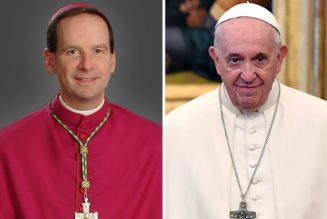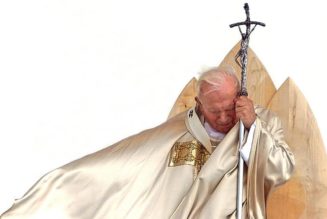
Father David Michael Moses likens the popular short-form video app TikTok to a bad neighborhood.
His comparison works, given the disturbing statistics outlined in a recent Associated Press report, “TikTok aware of risks kids face on its platform, lawsuit alleges.”
The statistics outlined in the AP story are alarming:
- TikTok aims at increasing user retention. “The ‘habit moment,’ as TikTok calls it, occurs when users have watched 260 videos or more during the first week of having a TikTok account. This can happen in under 35 minutes since some TikTok videos run as short as 8 seconds, the complaint says.”
- 95% of smartphone users under 17 used TikTok at least monthly, according to the complaint.
- Plus, roughly 36% of content normalizes pedophilia and 50% of content glorifies minor sexual assault.
Regarding the “bad neighborhood” of TikTok, Father Moses would never recommend that his nieces and nephews live there, but he knows that priests still need to serve the area.
“Every bad neighborhood should have a Catholic church and a priest there,” Father Moses told the Register. “I would not recommend my nieces and nephews all go on TikTok. But just like in a bad neighborhood, there are souls that need to be ministered to, and that is what missionary work is all about.”
Over the past three years, Father Moses has developed a robust internet presence, with 128K YouTube subscribers, 863K Instagram followers, and 325K followers on TikTok. Father Moses has developed a reputation as a fun, engaging young priest.
His content addresses common Catholic questions people have and highlights his daily life as a priest, including his love for surfing and his musical talents.
For Father Moses, it is not about the fandom or the likes; it is about reaching people where they are at.
“I’m all about going after the lost sheep,” Father Moses said. “There are a lot of lost people on TikTok, and the more lost they are, the more we need to bring them back to the Church.”
But if one day the platforms crashed or his account was shut down, Father Moses would not be phased. He would just find another avenue to reach people.
“I have no problem with continuing my ministry, but I would also have no problem if I had to stop it if the platform was shut down,” Father Moses said. “Wherever the souls are, that is where we are going.”
That very scenario may be on the horizon.
On April 24, 2024, President Joe Biden signed a bipartisan bill into law that would force the popular app to be sold or cease operations in the United States.
A U.S. appeals court upheld that the ban was constitutional after TikTok lawyers and creators argued that the ban violated the First Amendment’s protection of free speech. The Supreme Court will hear fast-tracked oral arguments on Jan. 10, 2025, delivering an opinion prior to when the ban is to take effect, Jan. 19.
Kara Fredrick has served as an intelligence officer with the Department of Defense working in digital surveillance, worked for social-media giant Facebook and studied the harmful effects of TikTok at the New American Security Think Tank. Now, Frederick serves as the director of the Heritage Foundation’s Tech Policy Center, focusing her study on TikTok.
“The law does not target the creators or the speech; it just purely targets the conduct of this digital platform itself,” she told the Register. “We have a long precedent of legislation that includes some statutes that do not allow foreign adversaries into our telecom network.”
When the ban goes into effect, new users will no longer be able to download the app, and existing users will no longer be able to update the app, leading to a slow death for the app.
For years, Fredrick and other researchers have been pushing for Congress to institute a widespread ban on the app. Professionals argue that the app, opened by Chinese company ByteDance, actively provides data to the Chinese communist government and seeks to manipulate what Americans view through the app’s powerful algorithm.
“It you are on TikTok, you’re carrying around a Chinese Communist Party official in your pocket at all times,” Frederick said. “You are not only opening yourself up to cyber vulnerabilities, you’re opening up your entire family; you are opening up your entire network and every friend that you ever talk to on your phone.”
“TikTok, through the software it installs on a device, collects information, not just from the TikTok app itself but from every website that you visit, because of the trackers and the software development kits,” Frederick explained.
In March 2023, Frederick and the Heritage Foundation published a report detailing the exploitative nature of TikTok through egregious data breaches. Frederick relied on a variety of sources, from a Wall Street Journal investigative piece to an Australian cyber security firm’s report that stated TikTok, in essence, operates as a spy app.
“The Wall Street Journal reported that in a period in 2019, TikTok was scooping up users’ unique device identifiers, specifically your MAC addresses [unique identifiers used in network communication and technologies, including WiFi and Bluetooth], which is very exploitative,” Frederick said. “It is exploitative because people change parts of their cellphone composition or delete an app, but they don’t necessarily change their device identifiers. This is something that pretty much travels with you, and TikTok can keep accessing your data even if you have deleted the app. Why would a cute music video app need to do that?”
Through the algorithm, TikTok feeds users a variety of videos that attempt to shape the users’ worldview and attempts to conform them to a particular way through instigating “trends.” These trends can convince children to harm themselves, such as the 2022 “blackout challenge,” which enticed kids to choke themselves until they blacked out and film the adrenaline rush of them regaining consciousness.
Bloomberg Business reported that this challenge alone was attributed to the deaths of 15 children under the age of 12.
“TikTok supercharges all of these cultural issues like transgender rights, pro-abortion and other cultural topics right into your brain, into your heart, and into your soul at a lightning pace through these videos,” Fredrick said, emphasizing the harm of the self-harm. “TikTok fed so many of these young children videos of the blackout challenge.”
This is the dark neighborhood that Father Moses and other Catholic TikTok creators like EWTN News find themselves in, in order to engage Catholics.
Ursula Murua manages EWTN News’ network of 50-plus social-media platforms, including TikTok, the fastest-growing social-media platform. Murua has pushed her team to focus on developing dynamic and engaging content to capture the attention of TikTok’s uses.
“We know that we have less than one second to engage with people, as they are used to consuming fast-paced content and news almost exclusively on social media,” Murua told the Register. “We try to present them with a glimpse of the treasure of our faith and feed curiosity towards the Catholic Church. We view TikTok as a discovery platform for Catholicism.”
But Murua stressed the dangers of TikTok and advised caution and prudence.
“As a parent and media professional, I advocate for a cautious approach to social-media use among children, and my recommendation is that children should avoid them,” she said.
“On the one hand, we cannot control social-media algorithms, and it seems almost impossible to have feeds free of inappropriate content. Allowing kids to use social media could let influencers interfere with their upbringing. On the other hand, users are always at risk of scams, identity thefts and even extortion. Why would a parent, knowing all these risks, expose their children? As parents, our focus should be to educate our children about digital literacy, help them develop critical thinking about social media, and equip them to navigate the digital world responsibly as they mature, rather than prematurely exposing them to its risks.”
Ascension also has developed a robust library of Catholic books, podcasts and videos. In the past couple of years, it has been expanding its digital footprint, including developing a TikTok page that features clips from popular videos and exclusive content from young Catholic evangelists.
“We know we’re competing with all kinds of content on TikTok — trends, dances, funny videos, you name it — so we know our content needs to grab attention and leave people more inspired and uplifted than the rest,” Amie Duke, Ascension Present’s social-media manager, told the Register.
Duke believes that if people are on TikTok, then Catholics need to meet them where they are.
“Pope Benedict XVI said it best back in 2009 on the World Day for Social Communications: ‘Young people … employ these new technologies to make the Gospel known, so that the Good News of God’s infinite love for all people will resound in new ways across our increasingly technological world!’” Duke said. “TikTok gives us a chance to do exactly that — meeting people where they are and planting seeds of hope in their daily lives.”
Frederick, a practicing Catholic, believes that there are better ways to evangelize than through TikTok and that doing so is too risky.
“There are other ways to get your message out there,” Frederick said. “Look at all of the priests on podcasts and making videos; there are plenty of other ways to make your message known.”
Until TikTok is dead, though, Father Moses and Catholic media teams will keep creating, editing and posting short videos to the site in the hopes of reaching even one person.
EWTN News would adapt if TikTok is shut down, as Murua and her team would simply focus on other growing platforms.
“The EWTN News digital team has seasoned and enthusiastic Catholic media professionals who are trying to reach out to souls everywhere,” Murua said. “While a TikTok ban would close one avenue of outreach, we’re prepared to pivot to emerging platforms, ensuring our mission of Catholic evangelization continues uninterrupted in the ever-evolving digital landscape.”
“No matter what happens, we’re not slowing down our efforts to share the Catholic faith online,” Duke said. “Ascension has been a leader in digital evangelization for years on platforms like YouTube, Facebook, podcasts and more, and we’ll continue to innovate and adapt.”
Father Moses has faith that the Lord will continue to bear fruit through his ministry even if TikTok shuts down, just as fruit has been borne through his efforts on the controversial app.
“We have two people in our RCIA program here at my parish that saw my videos online and didn’t even know the church was in the area, but they started researching the faith and wanted to take the next steps, so they reached out to the parish,” Father Moses said. “These people both said that seeing these videos was a huge connection point for them and made them interested in learning more about the faith.”
But Father Moses reiterated the dangers and “brokenness” of the app and cautions people regarding TikTok and other forms of social media.
“I am a big fan of people not having social media. The statistics are pretty clear that social media use is harmful to people, especially young people,” Father Moses said. “But we shouldn’t abandon the people in a bad neighborhood to the dangers of the neighborhood and pull away as a church simply because there’s risk there. I think we should have people who are properly trained to go and minister in these places.”









